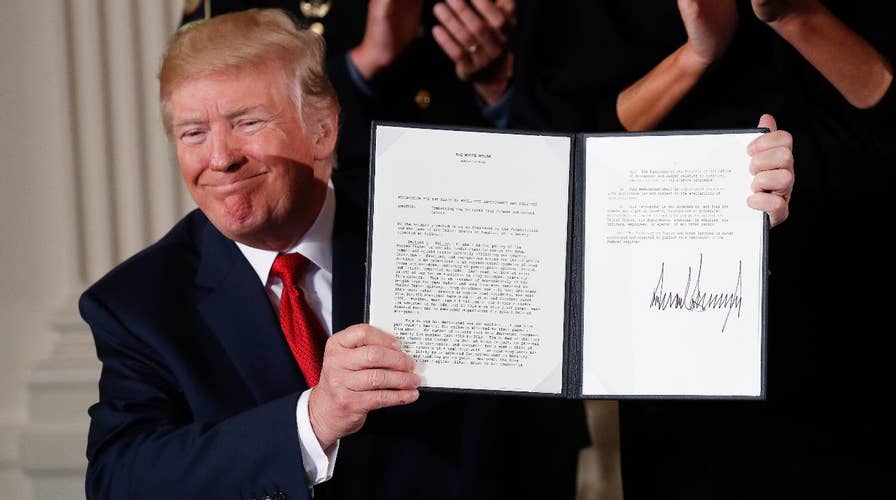Opioid crisis: What will Trump’s ‘public health emergency’ declaration actually do?
President Donald Trump declares the nation’s opioid crisis a ‘public health emergency’ to fight abuse of prescription painkillers, heroin and fentanyl. Here’s what declaring it an emergency will do.
Calling it a “national shame” and “human tragedy,” President Trump on Thursday declared the opioid epidemic crippling American communities a “public health emergency” and pledged federal resources to help combat the growing problem.
“Addressing it will require all of our effort, and it will require us to confront the crisis in all of its real complexity,” Trump said during a speech in the East Room of the White House.
“As Americans, we cannot allow this to continue,” Trump said. “It is time to liberate our communities from the scourge. ... We can be the generation that ends the opioid epidemic.”
Trump spoke to an audience at the White House that included family members of those affected by the opioid crisis, as well as several administration officials and elected leaders.
The president, who said “not one part of American society has been spared” from the crisis, stopped short of calling it a national emergency, something he previously promised he’d do. The announcement follows months of debate on how to tackle the problem.
'We can be the generation that ends the opioid epidemic.'
Trump himself has gone on record more than once saying he would declare the crisis a national emergency. Such a designation would allow states to tap into the same federal funds typically reserved for natural disasters like hurricanes through the Stafford Disaster Relief and Emergency Assistance Act.
HERE'S WHAT A PUBLIC HEALTH EMERGENCY MEANS
Instead, Trump signed a presidential memo that directs acting Health and Human Services Secretary Eric Hargan to declare a public health emergency under the Public Health Services Act -- which directs federal agencies to provide more grant money to combat the epidemic.
White House officials say the step helps cut through regulatory red tape and gives states more flexibility in how they use federal funds to fight the problem.
The designation will also allow changes such as expanded access to medical services in rural areas.
It doesn’t, however, create any additional funding.
The emergency declaration will last 90 days but can be renewed.
In 2015, 33,091 people died from opioid overdose, while 12.5 million people misused prescription opioids, according to the most recent statistics available from the Department of Health and Human Services.
The president on Thursday also revealed plans to take an “evil” opioid off the market immediately as well as the government’s intention to bring lawsuits against some of the drug makers, though he did not provide specifics. He also vowed to crack down on heroin imports from Mexico and fentanyl imports from China.
Pharmaceutical fentanyl is an opiate drug that’s up to 100 times more potent than morphine. In the past, drug dealers used it to spike the potency of the heroin they sold but traffickers are now selling fentanyl by itself.
Drug deaths involving fentanyl increased nearly 600 percent from 2014 to 2016, The Washington Post reported. There were 582 fatal overdoses linked to the synthetic drug in 2014. Last year, the number jumped to 3,946.
Trump also discussed the alcohol addiction that claimed his older brother Fred’s life in 1981.
“[Fred] had a problem with alcohol, and he would tell me, ‘Don’t drink, don’t drink,’” Trump said.
The president said watching his brother as well as other friends struggle with addiction is what set him on a no-drug, no-alcohol, no-cigarette path.
“There is nothing desirable about drugs,” Trump said. “They’re bad.”
Trump vowed to tackle the opioid crisis on the campaign trail, but critics claim his administration has been slow to act.
Trump created a presidential commission that in August recommended he declare the crisis a national emergency.
“Your declaration would empower your Cabinet to take bold steps and would force Congress to focus on funding and empowering the executive branch even further to deal with this loss of life,” the Commission on Combating Drug Addiction and the Opioid Crisis wrote. “It would also awaken every American to this simple fact: If this scourge has not found you or your family yet, without bold action by everyone, it soon will.”
However, White House officials told reporters Thursday morning that a national emergency declaration was not necessary in the case of opioids.
The public health emergency will "reorient all of the federal government and executive branch resources toward focusing on providing relief to this urgent need.”
Past instances of public health emergencies include the H1N1 influenza outbreak in 2009.
Since the commission released its report, Health and Human Services Secretary Tom Price has stepped down from his post while Trump’s pick for drug czar, Rep. Tom Marino, withdrew his nomination.
At an event at the Heritage Foundation earlier Thursday, Attorney General Jeff Sessions said it’s important to “reestablish the view that people should say no to drugs.”
“I do think this whole country needs to not be so lackadaisical about drugs,” he said. “Much of the addiction starts with marijuana. It is not a harmless drug.”













































